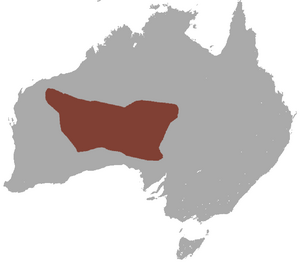Troughton's dunnart facts for kids
Quick facts for kids Ooldea dunnart |
|
|---|---|
| Conservation status | |
| Scientific classification |
|
| Kingdom: | Animalia |
| Phylum: | Chordata |
| Class: | Mammalia |
| Infraclass: | Marsupialia |
| Order: | Dasyuromorphia |
| Family: | Dasyuridae |
| Genus: | Sminthopsis |
| Species: |
S. ooldea
|
| Binomial name | |
| Sminthopsis ooldea Troughton, 1965
|
|
 |
|
| Ooldea dunnart range | |
| Script error: The function "autoWithCaption" does not exist. | |
Script error: No such module "Check for conflicting parameters".
The Ooldea dunnart (Sminthopsis ooldea) is a small marsupial from Australia. It is sometimes called Troughton's dunnart, named after the person who first discovered it. This little animal looks a bit like the hairy-footed dunnart.
Ooldea dunnarts have greyish-yellow fur on their backs and white fur underneath. They also have darker patches on their head and near their eyes. Their tail is pink, thin, and shaped like a carrot. These dunnarts are quite small, weighing only about 10 to 18 grams. They are usually 11.5 to 17.3 centimeters long, including their tail. Their body is about 5.5 to 8 centimeters long, and their tail is 6 to 9.3 centimeters long. Their ears are about 1.4 to 1.7 centimeters long.
Contents
Where Ooldea Dunnarts Live
The Ooldea dunnart lives in different parts of Australia. You can find them in the Tanami Desert in the Northern Territory. They also live south of there, near Ooldea in South Australia. Their home range stretches east into nearby areas of Western Australia.
These dunnarts like to live in many types of places. They can be found in dry eucalypt and acacia woodlands. They also live in heathlands, mallee scrub, and hummock grasslands. You might also spot them in low shrubland areas, open scrub, and tall open shrubland.
Life Cycle and Habits
Ooldea dunnarts are nocturnal, meaning they are most active at night. During the day, they hide in burrows or hollow logs to rest and stay safe.
Reproduction
Not much is known about the Ooldea dunnart's life cycle because they are not studied very often. However, we do know that they usually have babies between September and November. A mother Ooldea dunnart can have up to eight young at one time.
What Ooldea Dunnarts Eat
Scientists believe that Ooldea dunnarts mainly eat insects. They use their sharp senses to find and catch insects in their habitat during the night.
See also

- In Spanish: Sminthopsis ooldea para niños
 | George Robert Carruthers |
 | Patricia Bath |
 | Jan Ernst Matzeliger |
 | Alexander Miles |


